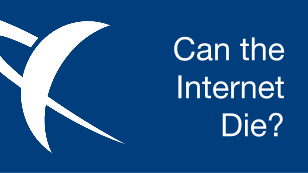Blog
Can the Internet Die?
 My previous blogs on the Internet have been optimistic, historical and even philosophical but we also need to challenge where this technology is leading us and how safe it is. Science Fiction writers are like our modern day oracles and reveal examples of how things could go wrong such as humans becoming Borg (Star Trek: The Next Generation) or being usurped by our machines (Terminator 3: Rise of the Machine) but I think it's more likely our cultural machines such as Corporations and Laws that don't benefit the masses could be of far more threat to us. However, before I get into that I must first address the physical aspect of the Internet. Can the Internet die?
My previous blogs on the Internet have been optimistic, historical and even philosophical but we also need to challenge where this technology is leading us and how safe it is. Science Fiction writers are like our modern day oracles and reveal examples of how things could go wrong such as humans becoming Borg (Star Trek: The Next Generation) or being usurped by our machines (Terminator 3: Rise of the Machine) but I think it's more likely our cultural machines such as Corporations and Laws that don't benefit the masses could be of far more threat to us. However, before I get into that I must first address the physical aspect of the Internet. Can the Internet die?
At it's present state, the answer is Yes. The Internet addressing system which is like a telephone number for each device connected to the Internet is managed by servers mainly hosted in the United States. If those servers were destroyed then the Internet would be largely limited to each country. However, the new Internet that is presently being created is more like a cloud where information such as your music archive is stored globally. For example, if my website is stored on Amazon's EC2 cloud network and the United States servers go down then the EC2 system would automatically route visitors to the version of my website that is stored on their United Kingdom servers and the website visitors wouldn't notice any difference. This technology is developing rapidly and will make the Internet 100% reliable which is important if it is to hold all the recordable knowledge on the planet."Essentially, corporations could use the Net to market three commodities: their own goods, access to the network, and advertising." (Golding, P. 806)If the Internet will become 100% reliable then the next question should be: What threats might arise on this new Internet? There are many and the World is grappling with them now. Here's some examples:
- If we've learnt that Mass Media institutions such as Radio and Television shape the way we view events how will modern institutions shape our perceptions. For example, if Time Warner (the fourth largest entertainment conglomerate in the world) owns HBO, Warner Brothers, Bebo, MapQuest, Booksellers, Newscorp, MySpace, Sunday Star Times, 20th Century Fox, etc. Does this type of control create homogeneous content to benefit them? Are we seeing Geobbel's Principles of Propaganda being applied across multiple media?
- Present research shows that poorer people don't have the same access to Internet technology and that it is largely being taken on by the more affluent. Will this create an even greater divide within society?
- How will this divide of Netizens and Non-netizens impact in the real world?
- Will commercially driven institutions such as iTunes dominate our access to information. As shown by Apples recent ban of the Google Talk application from their iStore; they are controlling what information and services we can access for their own benefit.
- Even if Prosumers own the the method of media production such as video cameras and computers. What control do they have to ensure their media is shown? Recent copyright infringements on YouTube have seen much of the content removed.
- Though the Internet started like the "Wild West" and there was much freedom, these freedoms are now being restrained through Government policy and commercial restrictions which determines what content we have access to. The recent agreement by Google to block specific content to Chinese customers is a good example of this.
"it is still possible for people around the world to make sure this new sphere of vital human discourse remains open to the citizens of the planet before the political and economic big boys seize it, censor it, meter it, and sell it back to us." (Rheihgold 1994) (Golding, P. 804)As shown above there are many aspects of the Internet that challenge our freedoms and could lead to a more controlled way of life but the opportunities for a far better world also exist. As part of the Internet Generation it's our role to ensure that this new machine improves the quality of life for further generations. In my next blog I'll discuss our new Internet Generation.
BibliographyGolding, Peter. "Worldwide Wedge: Division and Contradiction in the Global Information Infrastructure". Media Studies. A Reader. Ed. Paul Marris and Sue Thornham. 2nd ed. Edinburgh: Edinburgh University Press, 1999. pp. 820-815. From 154.311 New Media book of readings. Massey University, Palmerston North.
 About
About
Brynn


